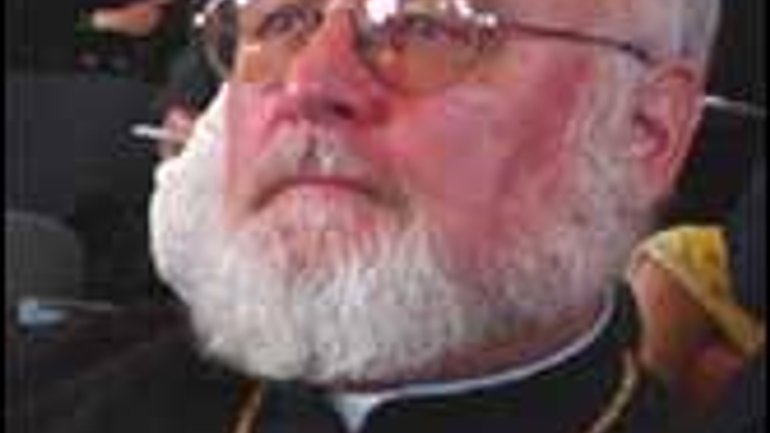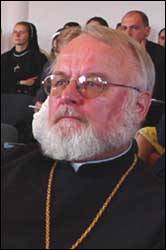"I think UCU faithfully follows the line of its founders, Metropolitan Andrey and Patriarch Josyf"

 Interview with Fr. Iwan DACKO, president of the Institute of Ecumenical Studies of the Ukrainian Catholic University
Interview with Fr. Iwan DACKO, president of the Institute of Ecumenical Studies of the Ukrainian Catholic University
-— Today, the Theological Center of the UGCC is being dedicated in Lviv. It will include Holy Spirit Seminary and the Philosophy and Theology Faculty of the Ukrainian Catholic University. You were engaged in the establishment of the Ukrainian Catholic University in Rome. What recollections do you have of that action?
— The dedication of Holy Spirit Seminary and the Philosophy and Theology Faculty of the Ukrainian Catholic University reminds me of the year 1969, late September-early October, when the late Patriarch Josyf dedicated the Church of St. Sophia and the building of the Ukrainian Catholic University [in Rome], which ceremony was attended by Pope Paul VI . The Pope then quoted the Bible saying: “Wisdom has built her house.” So, wisdom built a house for itself and the house should gather round itself all Ukrainians in Ukraine and abroad. Ukrainian spirituality and Ukrainian learning must develop in line with each other, because the education of the future generation has to be both deeply Christian and of a high quality and scholarly. We are opening a conference “Kairos [the crucial time] of the new generation.” Again I recall how, back then, Patriarch Josyf also convened a meeting of the Ukrainian Theological Academic Society and the younger generations gradually took over the leadership over that, the leadership of the new Ukrainian theological generation. The same thing is now happening in our native land. Everything was destroyed, but good always overcomes evil.
Another thing I think about is the figure of Fr. Werenfried van Straaten. He was the greatest benefactor of our church, with start of the establishment of the organization Aid to the Church in Need in 1947. He came here in 1991 with Patriarch Myroslav Ivan and saw all the needs. He said then: “I intend to build a seminary here.” The promise was fulfilled exactly by the organization Church in Need. It granted four million Euros for this project to build a bulwark of Ukrainian spirituality, and one hopes [the Theological Center] will fulfill its task.
— Patriarch Slipyj had his own vision of the Theological Center and Theological Academy. The Lviv Theological Academy, now the Ukrainian Catholic University, has existed for more than a decade now. Is there anything that Patriarch Josyf would have liked to see which is still lacking?
— I think the center will be finished in a year, and a substantial part of the existing structures of UCU will be moved to the center. I think, for the most part, we already fulfill the functions intended by Patriarch Josyf: the Philosophy and Theology Faculty, library, various institutes, so that now we have to develop all that and grow prudently, according to our strength. The second task is to maintain quality and not be tempted by the numbers, not to seek to have too many students. We should probably have less students, but good ones. And the main thing is to pass fundamental knowledge to the younger generation and to have transparent and honest management.
I remember Patriarch Josyf always stressing that, and Ukraine requires it. When he was in prison, an imprisoned fighter of the Ukrainian Insurgent Army once told him: “I did not do anything dishonorable in my life.” May every teacher and every student of UCU see and properly appreciate that. It is important. This is true “eliteness”: not in the sense of snobbery, saying that we are better, but in the sense that a new Ukrainian Christian intelligentsia is being raised: whether clergy or laity, who will take over the leadership in an honest and transparent Ukrainian society. So, for the most part, I think UCU faithfully follows the line of its founders, Metropolitan Andrey and Patriarch Josyf.
— There has been more than one graduating class from the Theology Department of UCU. What is their level of quality and in what demand are they in the church today? Does the church understand that it needs them?
— I think any clever bishop will need high-quality specialists in various fields, like dogmatics or moral theology, canon law or catechetics. One should clearly distinguish things which are strictly academic and scholarly from things which are administrative and church-political, in the sense of structure and so on. Every bishop should treat UCU and the seminaries as the apple of their eye. If we want to have a high-quality, professional administration, we must have professional people. And if I were any bishop, I would absolutely undoubtedly choose personnel exactly from among the qualified students or graduates of UCU sent to the West to study. There are also quite a number of students who find jobs here at UCU.
I wish to believe that, starting with the Orange days [the Orange Revolution of November-December 2004], our graduates will work in the state structures in Kyiv, in the Lviv region, in other regions of Ukraine. I repeat that every clever bishop should see that, and I trust we have clever leaders who see the need, like Metropolitan Andrey and Patriarch Josyf did, and like today’s Patriarch Lubomyr does.
— The reality is changing a little now, especially at the time of post-revolutionary events in Ukraine. Who else would be worth training in the university, what other requirements of society, and the church, in particular, should UCU meet?
— Social work is very important. We are doing something here already, but the church is still not sufficiently represented in social work, for example, work not only with alcoholics and drug addicts, but also with the elderly, unemployed, people in depression. Another area where we should be represented is charitable work. We should not leave aside orphan asylums, schools, and old people’s homes. This work can be done also in the ecumenical dimension. I think we can act jointly with the Orthodox, Roman Catholics and other brethren. In my opinion, social work may engage UCU graduates and laymen. We need to raise healthy Christian politicians, who would defend Christian positions both before our Parliament and in the government and in the state.
— Do you see a need in new directions which society needs?
— The whole of Western society today is crowded with computerized technology, and Ukraine grew poor in the area of humanities and classical studies not due to lack of knowledge, but due to historical circumstances. UCU is already dealing with that gap, but Ukraine will need many specialists in the area of the humanities, history, geography, and in the areas of classical languages: Greek, Latin, Byzantine studies.
An important thing is for our society not to be brought up only on the basis of consumerism, that is, the aspiration to have a high income. It is obvious that it is a great incentive or temptation with respect to work, but it is more important to bring up people in certain moral, scholarly, ethical or political values, to develop certain conceptions of political ethics, business ethics. In order for the idea of doing buisness not to imply being dishonest, in order for one to be able to be an honest businessman. So, we should deepen moral theology and other areas. And at the same time, to create effective management.
I hope our graduates will be part of state structures. The state should cooperate with scholarly institutions of this kind, because UCU can live on various private sponsorships for some time, but then, state benefits, church benefits must come into the picture, until our society becomes rich in sponsors or businessmen, or bankers, who would be able to support the thing, as it is done worldwide. Therefore, the work is very important.
— Does UCU now train specialists for state service? Is what is taught sufficient or is there anything else which needs to be taught?
— I do not think that is all. Our objective is not to raise future diplomats or future politicians, but we can expand as far as institutes or a law department are concerned, not only in the field of canon law, but also civil law, both church and state laws. Also, international relations, that is, establishing certain relations with various universities or institutes of international relations. The fact that that our university has good relations with the Kyiv-Mohyla Academy alone instills certain hopes that work will be done in that area. So, I think our university can and should do that, but it should be done in agreement with state structures. It is very important for us to get full-fledged recognition by the state in order for theology to be recognized, and then for us to coordinate or distribute functions between state universities, whether Catholic or other Christian ones.
— There exists now quite a popular thought among religious studies experts and journalists saying that Ukraine lacks exactly religious journalists, that is, persons able to write on religious and cultural-religious topics. Do you think UCU might train such specialists?
— I have certain experience in that, because when I lived in Rome in the 1980s there was a school of Christian journalists in Brussels, and it was the organization Church in Need that was very active in that area. I do not know if there are institutes training exclusively Christian journalists, but such a journalism department, educating students on a Christian basis, would be very useful. Another thing is church journalists. There is a famous Department of Vatican Studies, that is, of specialists in the Vatican state or Vatican system. We may still lack people like that. So, we can introduce such subjects even at the History Department. We need experts on the church: theologian-journalists, church study specialist-journalists, who would know church history. The problem could be solved by UCU.
Interview conducted by Taras Antoshevskyy in Lviv on 27 August 2005









